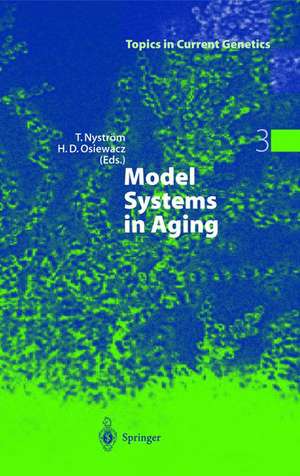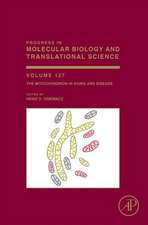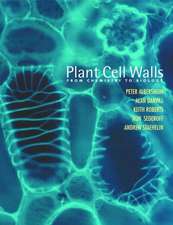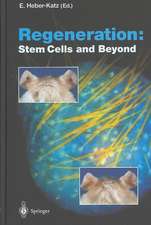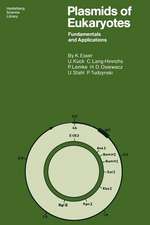Model Systems in Aging: Topics in Current Genetics, cartea 3
Editat de Thomas Nyström, Heinz D. Osiewaczen Limba Engleză Hardback – 22 sep 2003
This book takes the reader from unicellular bacterial deterioration via senescence in fungi and worms to aging in rodents and humans, allowing a comparative view on similarities and differences in different genetic model systems. The different model systems are scrutinized in the light of contemporary aging hypothesis, such as the free radical and genomic instability theories.
| Toate formatele și edițiile | Preț | Express |
|---|---|---|
| Paperback (1) | 1217.75 lei 6-8 săpt. | |
| Springer Berlin, Heidelberg – 22 oct 2010 | 1217.75 lei 6-8 săpt. | |
| Hardback (1) | 1227.52 lei 6-8 săpt. | |
| Springer Berlin, Heidelberg – 22 sep 2003 | 1227.52 lei 6-8 săpt. |
Din seria Topics in Current Genetics
- 18%
 Preț: 1227.99 lei
Preț: 1227.99 lei - 18%
 Preț: 947.35 lei
Preț: 947.35 lei - 18%
 Preț: 1220.75 lei
Preț: 1220.75 lei - 18%
 Preț: 1833.16 lei
Preț: 1833.16 lei - 18%
 Preț: 1228.62 lei
Preț: 1228.62 lei - 18%
 Preț: 1833.16 lei
Preț: 1833.16 lei - 18%
 Preț: 1223.55 lei
Preț: 1223.55 lei - 18%
 Preț: 1224.06 lei
Preț: 1224.06 lei - 18%
 Preț: 1837.88 lei
Preț: 1837.88 lei - 18%
 Preț: 1551.11 lei
Preț: 1551.11 lei - 18%
 Preț: 1239.37 lei
Preț: 1239.37 lei - 18%
 Preț: 1826.07 lei
Preț: 1826.07 lei - 18%
 Preț: 1226.11 lei
Preț: 1226.11 lei - 18%
 Preț: 1216.78 lei
Preț: 1216.78 lei - 18%
 Preț: 944.51 lei
Preț: 944.51 lei - 18%
 Preț: 949.73 lei
Preț: 949.73 lei - 18%
 Preț: 1223.55 lei
Preț: 1223.55 lei - 18%
 Preț: 1226.90 lei
Preț: 1226.90 lei - 18%
 Preț: 1826.85 lei
Preț: 1826.85 lei - 18%
 Preț: 2100.25 lei
Preț: 2100.25 lei - 18%
 Preț: 954.93 lei
Preț: 954.93 lei - 18%
 Preț: 1827.63 lei
Preț: 1827.63 lei - 18%
 Preț: 1228.96 lei
Preț: 1228.96 lei
Preț: 1227.52 lei
Preț vechi: 1496.99 lei
-18% Nou
Puncte Express: 1841
Preț estimativ în valută:
234.92€ • 244.35$ • 193.94£
234.92€ • 244.35$ • 193.94£
Carte tipărită la comandă
Livrare economică 15-29 aprilie
Preluare comenzi: 021 569.72.76
Specificații
ISBN-13: 9783540024903
ISBN-10: 3540024905
Pagini: 316
Ilustrații: XV, 301 p.
Dimensiuni: 152 x 229 x 23 mm
Greutate: 0.73 kg
Ediția:2004
Editura: Springer Berlin, Heidelberg
Colecția Springer
Seria Topics in Current Genetics
Locul publicării:Berlin, Heidelberg, Germany
ISBN-10: 3540024905
Pagini: 316
Ilustrații: XV, 301 p.
Dimensiuni: 152 x 229 x 23 mm
Greutate: 0.73 kg
Ediția:2004
Editura: Springer Berlin, Heidelberg
Colecția Springer
Seria Topics in Current Genetics
Locul publicării:Berlin, Heidelberg, Germany
Public țintă
ResearchCuprins
Conditional senescence in prokaryotes.- Aging and mitochondrial dysfunction in the filamentous fungus Podospora anserina.- Mitochondria, metabolism, and aging in yeast.- Yeast as a model for ageing and apoptosis research.- Energy metabolism, anti-oxidant defense and aging in Caenorhabditis elegans.- Do green plants age, and if so, how?.- Mammalian and bird aging, oxygen radicals, and restricted feeding.- Aging and the programmed death phenomena.- The human Werner Syndrome as a model system for aging.- Role of subcytotoxic stress in tissue ageing.
Textul de pe ultima copertă
Aging is the progressive decline in biological functions over time. This decline targets macromolecules, cells, tissues and, as a consequence, whole organisms. Despite considerable progress in the development of testable hypothesis concerning aging in an evolutionary context, a unifying theory of the molecular/physiological mechanistic causes of aging has not been reached. In fact, is it not clear to what extent aging is a programmed or stochastic process.
This book takes the reader from unicellular bacterial deterioration via senescence in yeast and worms to aging in rodents and humans, allowing a comparative view on similarities and differences in different genetic model systems. The different model systems are scrutinized in the light of contemporary aging hypothesis, such as the free radical and genomic instability theories.
This book takes the reader from unicellular bacterial deterioration via senescence in yeast and worms to aging in rodents and humans, allowing a comparative view on similarities and differences in different genetic model systems. The different model systems are scrutinized in the light of contemporary aging hypothesis, such as the free radical and genomic instability theories.
Caracteristici
The unique feature of this book is its comparative approach to different genetic model systems Full text available online for subscribers of the series
